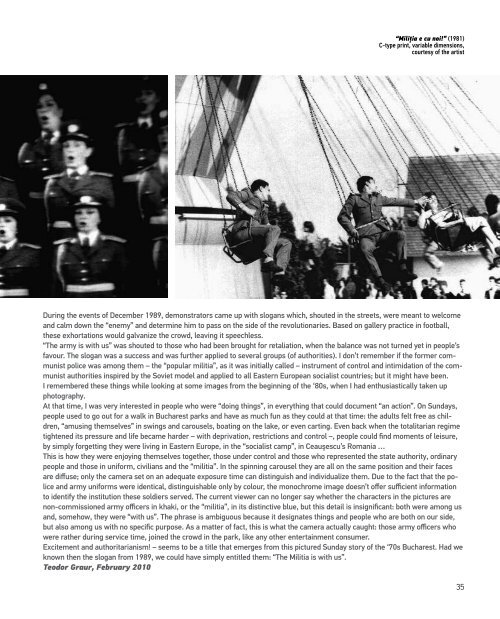Catalogue Police the police
Catalogue Police the police
Catalogue Police the police
You also want an ePaper? Increase the reach of your titles
YUMPU automatically turns print PDFs into web optimized ePapers that Google loves.
“Miliţia e cu noi!” (1981)<br />
C-type print, variable dimensions,<br />
courtesy of <strong>the</strong> artist<br />
During <strong>the</strong> events of December 1989, demonstrators came up with slogans which, shouted in <strong>the</strong> streets, were meant to welcome<br />
and calm down <strong>the</strong> “enemy” and determine him to pass on <strong>the</strong> side of <strong>the</strong> revolutionaries. Based on gallery practice in football,<br />
<strong>the</strong>se exhortations would galvanize <strong>the</strong> crowd, leaving it speechless.<br />
“The army is with us” was shouted to those who had been brought for retaliation, when <strong>the</strong> balance was not turned yet in people’s<br />
favour. The slogan was a success and was fur<strong>the</strong>r applied to several groups (of authorities). I don’t remember if <strong>the</strong> former communist<br />
<strong>police</strong> was among <strong>the</strong>m – <strong>the</strong> “popular militia”, as it was initially called – instrument of control and intimidation of <strong>the</strong> communist<br />
authorities inspired by <strong>the</strong> Soviet model and applied to all Eastern European socialist countries; but it might have been.<br />
I remembered <strong>the</strong>se things while looking at some images from <strong>the</strong> beginning of <strong>the</strong> ‘80s, when I had enthusiastically taken up<br />
photography.<br />
At that time, I was very interested in people who were “doing things”, in everything that could document “an action”. On Sundays,<br />
people used to go out for a walk in Bucharest parks and have as much fun as <strong>the</strong>y could at that time: <strong>the</strong> adults felt free as children,<br />
“amusing <strong>the</strong>mselves” in swings and carousels, boating on <strong>the</strong> lake, or even carting. Even back when <strong>the</strong> totalitarian regime<br />
tightened its pressure and life became harder – with deprivation, restrictions and control –, people could find moments of leisure,<br />
by simply forgetting <strong>the</strong>y were living in Eastern Europe, in <strong>the</strong> “socialist camp”, in Ceauşescu’s Romania …<br />
This is how <strong>the</strong>y were enjoying <strong>the</strong>mselves toge<strong>the</strong>r, those under control and those who represented <strong>the</strong> state authority, ordinary<br />
people and those in uniform, civilians and <strong>the</strong> “militia”. In <strong>the</strong> spinning carousel <strong>the</strong>y are all on <strong>the</strong> same position and <strong>the</strong>ir faces<br />
are diffuse; only <strong>the</strong> camera set on an adequate exposure time can distinguish and individualize <strong>the</strong>m. Due to <strong>the</strong> fact that <strong>the</strong> <strong>police</strong><br />
and army uniforms were identical, distinguishable only by colour, <strong>the</strong> monochrome image doesn’t offer sufficient information<br />
to identify <strong>the</strong> institution <strong>the</strong>se soldiers served. The current viewer can no longer say whe<strong>the</strong>r <strong>the</strong> characters in <strong>the</strong> pictures are<br />
non-commissioned army officers in khaki, or <strong>the</strong> “militia”, in its distinctive blue, but this detail is insignificant: both were among us<br />
and, somehow, <strong>the</strong>y were “with us”. The phrase is ambiguous because it designates things and people who are both on our side,<br />
but also among us with no specific purpose. As a matter of fact, this is what <strong>the</strong> camera actually caught: those army officers who<br />
were ra<strong>the</strong>r during service time, joined <strong>the</strong> crowd in <strong>the</strong> park, like any o<strong>the</strong>r entertainment consumer.<br />
Excitement and authoritarianism! – seems to be a title that emerges from this pictured Sunday story of <strong>the</strong> ‘70s Bucharest. Had we<br />
known <strong>the</strong>n <strong>the</strong> slogan from 1989, we could have simply entitled <strong>the</strong>m: “The Militia is with us”.<br />
Teodor Graur, February 2010<br />
35


